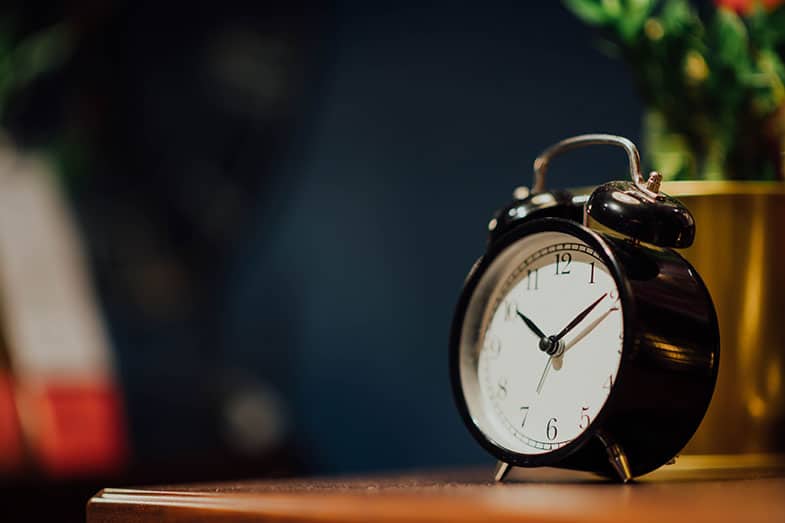How to Stop Sleeping Through Your Alarm
Disclosure: We may get commissions for purchases made through links in this post.
If you’re reading this, chances are that you are a victim of sleeping through your alarm, only to wake up and realize that you have ruined your daily schedule. If so, you are not alone. Almost all of us are victims of either ignoring our alarms or snoozing them for ‘just a few more minutes’ in bed. This occasionally happens to everybody, but if it’s very regular with you, you may have reason to worry. At this juncture, it’s vital to find out exactly why this keeps happening to you regularly. While it could be true that you fail to hear the alarm, this doesn’t take you to the root of the issue. Could there be real reasons why this happens?
How do I stop sleeping through my alarm? Plan your day in advance. This mentally prepares you to wake up at a time that you choose. Use multiple alarms, and move them far away from the bed so that you have to get up to turn them off. Lastly, have something to look forward to in the morning.
Many times when we’re unable to hear the alarm and wake up late, we blame our sleeping time. You probably slept late watching Netflix, or were involved in other late-night activities. However, when getting up becomes very chronic, it’s time to dissect through your sleep schedule, lest you fall back in your daily productivity. Here are several reasons why you could be sleeping through your alarm.

Why You’re Sleeping Through Your Alarm
1. You Aren’t Getting Enough Sleep
One of the most common reasons why people extend sleeping time is lack of sufficient sleep. If you don’t sleep enough at night, chances are you will extend your sleeping time, just to try and reduce the intense sleep in your eyes. It’s highly recommended for every adult to have at least six to nine solid hours of sleep. If you sleep outside this bracket, you need to sit back and reset your sleeping schedule.
You may have conditioned your body to do with less sleep than what is recommended. Well, for a while all may seem to be well, until accumulated fatigue catches up with you, regardless of the number of alarms you set.
Most people today have lost the luxury of enjoying the whole evening to themselves. This is due to today’s busy lifestyles, where evenings are taken up by an extra job for that much-needed extra buck, or an evening or late night class. You could also find yourself having an evening schedule where children need your utmost attention. Nevertheless, regardless of your busy schedule, you should intentionally prioritize your sleep because it has a great bearing on your health. If you truly know, deep in you, that you aren’t having sufficient sleep due to exhaustion, find out how you can adjust your sleeping schedule in order to squeeze in more time for rest.
2. Poor Sleeping Schedule
If you travel a lot, you’re a student, or you have a job that’s done in rotational shifts, your sleeping schedule could as well be nonexistent. You may set your alarm in correspondence to your uncertain schedule, but this may not serve you effectively because your body may find it hard to adjust to it. Waking up on time can be very habitual. You can train your body when to fall asleep and when to wake up. If this is impossible with you, your body will always try to catch sleep whenever it can, regardless of your buzzing alarm or noise.
3. Dehydration
Stop and ask yourself whether you drink enough water or not. It is recommended that every adult drinks at least eight glasses daily. You’re also supposed to drink some water before bedtime. Doing this keeps your body hydrated and helps you get up and out of bed if you have to go. Your body may ignore the alarm, but it can never ignore the call of nature. This may not be an ideal science to help you get up early, but if you get into the habit of ensuring your body is well hydrated, your body is likely to change its cycle to your advantage.
4. Depression
Depression may be a factor for why it is difficult to wake or get up. When you do get up, you could be experiencing lethargic, anxious and overwhelming mornings. Your depressed state could also be the reason you either ignore your alarm, or you don’t hear it altogether. The effects of depression encompass sleeplessness, which is a real reason why you miss your alarm, because you catch sleep when you should wake up.
Regardless of the dimension of depression you’re are suffering from, it’s vital for you to see a professional mental health practitioner for support. It’s not just because of missed alarms that you should see a professional. As long as you are experiencing other symptoms of depression like anxiety, fatigue, irritability, excessive fear of the unknown, restlessness. among others, seek out professional help.
5. Sleep Disorder
Sleep disorder arises from a disorder in our bodies’ circadian rhythms. It’s our circadian rhythm that determines how our bodies’ internal clock works with our brain and bodies. It operates on the 24 hour cycle, with response to dark and light on the outside, being night and day. When your internal clock is interfered with, it becomes difficult to fall asleep or wake up in good time. This happens especially when you travel. However, if it becomes chronic, you could actually be suffering from acute circadian rhythm disorder. Therefore, keeping a diary of how your sleep is disrupted is very important.
Once you establish that indeed it is a disorder, don’t hesitate to see a doctor. As much as doctors will carry out clinical examination, your diary may be critical in pointing out the intensity of the matter. If this explains your case, don’t be scared. Just seek help from professional medical personnel and move on from there.
Having looked at the possible causes of sleeping through your alarm, let’s now focus on how to counter them and ensure that you wake up with your alarm.
How to Avoid Sleeping Through Your Alarm

If you truly know that honoring the cry of your alarm is a challenge, strive to overcome it by doing at least one or a combination of the following.
1. Plan Your Daily Activities in Advance
Planning your day in advance gives you something to look forward to. Going to bed with a pre-planned tomorrow in mind aligns your body to the fact that you have to wake up in good time to ensure that the day’s program is fulfilled. Without feeding yourself with a program in advance, your body will resist the alarm when it rings, having nothing special to wake up to.
In your plan for the day, you may include an early morning run or work out in the gym. This conditions the body to align with the laid out program. This becomes the assignment, definition and objective of the alarm. So, when it rings, this is the message the body will receive, making it easy for you to obey the alarm actually wake up.
2. Make It as Positive as You Can
Make it interesting to wake up. Aid the circadian rhythm by introducing light in the bedroom as soon as the alarm goes. If the outside is still dark, switch on the light. Day light bulbs work best for this function. The body will immediately respond to the external light and stop producing melatonin, the chemical substance responsible for lulling the body to sleep.
3. Place Your Alarm Far from the Bed
Don’t place your alarm where you can easily switch off while still half asleep. Place it at a reasonable distance away from the bed, where you actually have to wake up in order to switch it off. It’s very difficult to get out of bed, look for the alarm to switch it off, and still get back to sleep. That disruption is sufficient to get you started for the day.
4. Use Multiple Alarms
You can ignore one alarm, but not a number of them. So, be creative with your alarm. Several, subsequent disruptions will work to jerk your body out of its sleepiness.
5. Avoid Snoozing
It’s a lie that a little more sleep will make you feel better when you finally wake up. However, it only makes you more groggy when you finally wake up. It’s scientifically proven that snoozing actually makes you feel even more sleepy. It drives your mind into another sleepy cycle that would take time to get over. Such a cycle may not be over by the time you actually force yourself out of bed. This may start you off on a poor footing for the the day.
Conclusion – How to Stop Sleeping Through Your Alarm
In conclusion, it’s important to know that we are all very unique. What affects one person may not necessarily affect another. It’s important to reexamine your sleeping schedule as soon as you notice any anomalies. Be honest with yourself to find the exact reason to why you sleep past your alarm. Once you notice anything, try to find an immediate solution. If it’s something medical, don’t hesitate to get medical support. Your health comes first.






